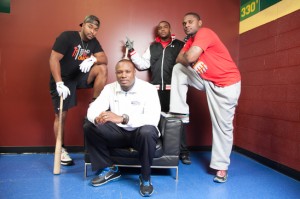
I meet with young people every day who share with me their dreams for taking that next step. For some, it’s to play baseball at a higher level – high school, college, even on the professional level. For others, baseball is a road on the journey to higher education.
Whatever your dreams or intentions are, I have dedicated myself to helping you reach as high as you want to reach. Below is the compilation of my five-part series designed to provide you with the insights you need – both physically and mentally – to get a scholarship to play college baseball.
The roadmap is in front of you. Read it. Embrace it. Use it to make your dreams come true. If we know anything, it is that the journey ahead is filled with ups and downs – each one serving as a lesson for the goal at end.
It’s up to you to go for it. I’m here to help give you the tools you need.
Part 1 – How to earn a baseball scholarship
Developing skills is about pushing yourself beyond what you’re capable of in the classroom and/or on the practice field.
I’ll be the first to tell you that there is a lot of money to be made when the baseball industry complicates the process of earning a scholarship. Baseball is a complex game, but the earning a scholarship part really isn’t that complicated. Here is the first steps in your plan:
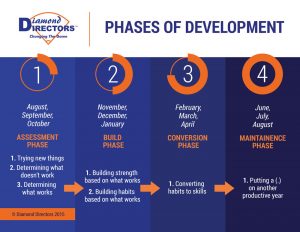 No. 1 – Develop good habits
No. 1 – Develop good habits
It takes 3,000 reps to develop a habit. Good habits can be developed by osmosis, but why take a chance on that? The good habits needed to earn a college scholarship are mental, academic, physical and relational.
The mental habits required to earn a baseball scholarship include:
- Character – How you behave even when nobody is looking
- Grit – Strength of character is required when things aren’t going your way
- Humility – Thinking of others first without thinking of yourself less
The academic habits required to earn a baseball scholarship include:
- Study more
- Achieve more
- Help other classmates more
Physical habits are based on the parts of the swing required to earn a baseball scholarship. They include:
- Stance/Load x 3,000 reps
- Timing x 3,000 reps
- Tempo x 3,000 reps
- Tracking x 3,000 reps
- Approach x 3,000 reps
- Contact x 3,000 reps
- Extension/Finish x 3,000 reps
The relational habits required to earn a baseball scholarship include:
Contact the coaching staff on a weekly basis and ask the following questions.
- How are you and your family doing?
- How is your coaching staff doing?
- How is the baseball team performing in the classroom and on the baseball field?
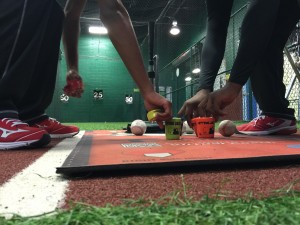
No. 2 – Convert habits to skills
Ironically, bat manufacturers have skills, but the majority of youth through college players don’t. Things like Hot Pockets come with instructions on how to cook them in the microwave, but bats, tees and batting gloves don’t.
I’m not convinced that college coaches should be solely responsible for helping hitters develop beyond the following:
- Share their team mission and vision.
- Share their philosophy and methodology for development.
- Make players aware of the parts of the swing they teach in sequence.
- Provide reps to players so that they can enter a program and quickly develop on their own. Players must have high levels of aptitude to do this. The SAT (Scholastics Aptitude Test) measures aptitude.
Basically, I’m suggesting that either players have IT (intelligence and teachability) or they don’t. If you don’t have intelligence and teachability, playing competitive college baseball will be a miracle.
Habits convert to skills when you are deep in practice. Don’t talk about obtaining skills if you don’t have good habits. To understand the habits you need to convert to skills, reread the previous paragraphs.
Skills pay the bills, and if you don’t want to pay for college, you better have mental, academic, physical and relational skills. Developing skills is about pushing yourself beyond what you’re capable of in the classroom and/or on the practice field. It’s about getting comfortable with being uncomfortable. It’s not about studying for a math test or hitting a ball off of a batting tee for five hours straight.
It’s about breaking up your study and practice time into these 4 S’s:
- Simplify what you are doing
- Small segments
- Short time for practice
- Slow pace
Hitting baseballs off of a batting tee is simple. Hitting a baseball off of a batting tee, while focusing on hitting a dime sized target 20 feet away for 100 reps, five days per week simplifies the hitting process. By doing this, you accidentally will develop a skill because you will be forced to practice deeply.

No. 3 – Play on the right teams
Teams play baseball games for feedback based on what you’re learning from your practice. We lose the ability to develop literally millions of youth baseball players into good baseball players right here, because we put too much stock into playing the games to learn to develop the skills to play.
Games are feedback that direct you on what to work on during your next practice. If you want to develop hitting skills using your baseball games, focus your at-bats wisely, so that you’re prepared to earn a scholarship because bat speed, power and the way you look in a uniform isn’t enough.
- 25 percent of your at-bats should be against below average pitching
- 25 percent of your at-bats should be against average pitching
- 50 percent of your at-bats should be against above average pitching
Most hitters feel they can only improve their hitting skills against above average pitching. But if you’re a skillful hitter, you should dominate any and all pitching. Check your stats against the average and below average pitchers. If you aren’t batting above .700 against them, you aren’t as good as you think you are.
And, by the way, developing grit occurs when you have to face pitchers you don’t want to face.

If you have good habits and skills, start making your coach work right now, since you have something of value that he can promote to coaches at the next level. Communicate with your coach the one to three college programs you are interested in playing with.
These require you already know you have or will have the minimum academic and test scores to get into the schools. Ask that your coach lets you know within one to 10 games of you playing if he supports or rejects those schools, because you will him to call and send emails to them on your behalf.
It shouldn’t take more than 10 games for your coach to give you a response. You’re playing on the team for reps, relationships and a response from your coach.
Practice is for preparing for games, and games are for feedback to determine what to work on at the next practice.
Part 2: All about the grades
In the second part of your journey, we are looking at the important role that having good grades plays in the process. Don’t forget that college is higher education. Your high school grades and test scores allow you to prove you can handle the responsibilities required to participate at the next level. The SATs (Scholastics Aptitude Test) arguably are the most important test that any college looks for, especially from student-athletes.
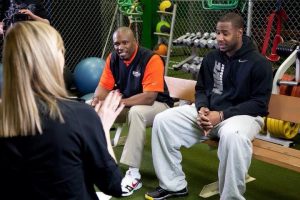
The SATs measure your aptitude, which prove your ability to learn and apply. Aptitude is a skill that you need in the classroom – and definitely on the baseball field.
Select one to three schools that you can get into academically (you must have the grades and test scores) and compete at athletically (you can produce even without the skills). This requires having an honest conversation with your school counselor, who can give you an assessment on your grades (just like a professional baseball scout or professional swing coach like myself does).
I get paid to be honest and, as we know from experience, the truth will always set you free. My advice is about what to start doing and what to stop doing. The lesson here is that if you don’t start developing sound academic and athletic habits, you won’t have the necessary attributes to get a college scholarship.
Remember – “Put all of your eggs in one basket and watch them like a hawk.”
On the field, Major League Baseball scouts evaluate the following tools with a current and future grade of 20-80, with a 50 being Major League average:
- Hitting for average
- Hitting for power
- Fielding
- Throwing
- Running
If you score at least a 50 on either of these (as a current or future grade), you definitely will receive a baseball scholarship at most major colleges. And you definitely will be in line for the MLB Draft. A score of 30 will enable you to compete at a smaller college.
My advice, if you are serious about playing at the college level, is to find a professional hitting coach to help you navigate the development process of your swing as well as the evaluation process by a MLB scout. The key is to get an honest evaluation from professionals, rather than hope that just because you play on a good travel team, you are automatically entitled to a scholarship.
Part 3: Why college camps matter
So we’ve identified the importance of developing good habits, converting habits to skills, playing on the right teams and the important role being a good student plays in the process. Here, we look at why it’s important to attend college camps.
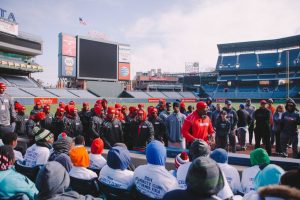
This is pretty cut and dried. Do you know why bank robbers rob banks? Because that’s where the money is. If you want to earn a scholarship, you must attend at least one to three college camps, particularly the programs you are most interested in.
Sure, it’s great to be seen by college coaches at tournaments, but most of the top tournament games are played at multiple locations scattered over several miles. Either you have to be skillful enough for the coach to evaluate you or the opposing team has studs.
Here are the three steps that I recommend when attending camps, assuming you have good habits and skills.
- You simply are attending this camp to develop an awareness of other players attending the camp, what the coach teaches, how the coach teaches and to find out specifically what he feels you must improve on for your second attendance.
- You’ve hopefully worked with a skill coach to make improvements from the first camp. Now you are here to showcase the adjustments you made. Make it a point before you leave the camp to ask the coach how you did on the adjustments you made.
- You are attending this camp to get a scholarship offer. This is more than a mindset or wishful thinking. This is based on the habits and skills you’ve developed in practice and the feedback you received from the games you played. This is based on having the grades to get into the school and the weeks of initiated conversation with your coach.
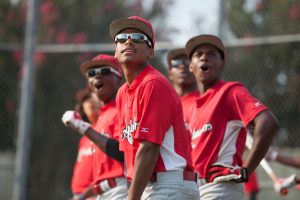
Part 4: Why you need to use your teams to showcase your skills
One of the most important parts of your plan is to use your team to showcase your skills. If you have good habits, skills and have attended college camps that you can get accepted into, it’s time to use your high school and travel teams to showcase your skills. There’s no other reason to be on one of these teams if you’re still trying to earn a scholarship.
I also realize the joy of winning tournaments, because I have a National Championship ring of my own from coaching with Guerry Baldwin of the East Cobb Astros 16U team.
After a college coach has evaluated you on his campus and has expressed interest in your talents, expect him to attend your games. This will enable him to further evaluate you in “game action.” As you reread that last sentence, please place an emphasis on the fact that the coach has expressed interest in you after your camp performance. If he’s interested in you, he will tell you. That’s his job.
Some people say that college camps are just money makers. What’s wrong with that? A college baseball camp is the right place and the right time to be seen by a coach. A tournament can’t provide that type of access, unless it’s USA Baseball’s “Tournament of Stars,” which is invite only.
Showcases such as East Coast Professional, Area Code and Perfect Game National are invitation-only tournaments as well. And, yes, they are worthwhile for the country’s elite players. If you haven’t been invited to one of these games and you want play college baseball, you better attend a camp and perform well enough that a coach expresses interest in evaluating you in some games.
I realize it can be disappointing if a coach doesn’t verbally express interest in you. Don’t avoid the truth, because it will cause you to waste more time and money.
Has a college coach at your top three college choices personally contacted you by phone? Letters and emails are cool, but you are truly being recruited if and when you receive a phone call from a college coach.

Part 5: The power of relationships
The final part of your plan is one of the most critical aspects of playing the game – it’s the importance of developing relationships.
Often times, this is where your high school and travel ball coach is most needed. There isn’t much time for them to teach you how to play baseball, but they should have relationships with college coaches that you can leverage. And if they don’t have a relationship with one of your top three schools, they should be resourceful enough to develop those relationships.
Does your coach believe in you enough to attach his name to you when speaking to college coaches on your top three list?
It’s time to ask, if you have good habits, skills and have attended the college camps of colleges you can get accepted into and you’ve showcased your skills in front of them during your high school and travel team games.
“Coach, I would like to be a Georgia Bulldog. That’s my first choice as a student-athlete. How do you feel about that?”
This blueprint is designed to give you a strategy for making your dream of playing college baseball a reality.
It’s time to put your plan into motion. Now, what are you going to do?
Remember: Intelligence trumps being smart.
For more information, visit www.diamonddirectors.com today. Also, check out our Digital Magazine.
BIO
C.J. Stewart has built a reputation as one of the leading professional hitting instructors in the country. He is a former professional baseball player in the Chicago Cubs organization and has also served as an area scout for the Cincinnati Reds. As founder and CEO of Diamond Directors Player Development, CJ has more than 12 years of player development experience and has built an impressive list of clients, including some of the top young prospects in baseball today. If your desire is to change your game for the better, C.J Stewart has a proven system of development and track record of success that can work for you.

Leave a Reply